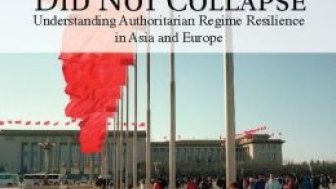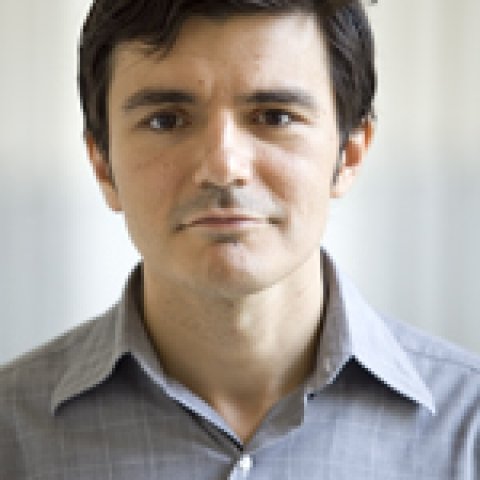Martin Dimitrov
Former Fellow
Professional Affiliation
Associate Professor, Tulane University
Expert Bio
My scholarly interests focus on governance under authoritarianism, on authoritarian regime resilience, and on property transformation in post-communism regimes. My first major project appeared in 2009 as Piracy and the State: The Politics of Intellectual Property Rights in China from Cambridge University Press. This book investigates the conditions under which rationalized state capacity may emerge in an authoritarian state like China. I argue that rationalized state capacity does not arise overnight, either in response to foreign pressure or in a crisis situation, but instead develops in much more mundane ways, where the routine enforcement of laws and regulations is subject to clear principles of accountability and is conducted by enforcers with strictly defined mandates. This project has implications both for the study of Chinese politics and for our general understanding of the relationship between democracy, rationalized state capacity, and the rule of law. The project is broadly comparative: it puts the Chinese case in context by using evidence collected through fieldwork in five other countries (Taiwan, Russia, the Czech Republic, France, and the United States). Completing the project was made possible through financial support from the Social Science Research Council; Stanford University; several research centers at Harvard; and Dartmouth College, where I have taught since 2004.My second major project is concerned with the collapse and resilience of communist autocracies. Two decades after the fall of the Berlin Wall, we still have no clear answer to the central question why some communist regimes survived while others collapsed. My project examines both the reasons for communist collapse in Eastern Europe and the factors underlying stability in the five resilient regimes in Asia and Latin America. Two books will issue from this research. The first is an edited volume (currently under review at Cambridge University Press) entitled Why Communism Didn't Collapse: Exploring Regime Resilience in China, Vietnam, Laos, North Korea, and Cuba. This volume is based on a conference on communist resilience I organized at Dartmouth College. My main project for the Woodrow Wilson Fellowship will be a book-length manuscript on communist collapse and resilience, which uses pre-1989 Eastern Europe as a lens for understanding regime resilience in contemporary China. Most of the chapters of this manuscript have been drafted, but substantial revisions remain to be done during my fellowship year. The manuscript is based on access to unique data in the formerly closed communist party and secret police archives in Eastern Europe, as well as on previously unexplored internal circulation (neibu) materials from China. I am currently in the formative stages of a third major project, which focuses on property transformation in post-1989 Eastern Europe and in contemporary China. My question is "who got rich"—hard-working honest entrepreneurs or individuals with the right connections provided through membership in the networks of the secret police and the communist party. Previously unexplored documents that I obtained from the Bulgarian State Security and the Bulgarian Communist Party archives reveal that most of the post-1989 oligarchs had a pre-1989 connection to State Security. My hypothesis is that similar findings may emerge for the majority of the successor states of the Soviet Union and most of the successor states of Yugoslavia, as well as for Romania, Albania, and Mongolia. Additional research in the State Security and communist party archives in these countries will be necessary to ascertain whether, as in Bulgaria, the delayed exit from communism allowed processes of strategic redistribution of state property to members and associates of the secret police to continue without interruption after 1989. For the Chinese case, given that access to State Security files is impossible, mapping out the relationship of entrepreneurs with the Communist Party can serve as a useful first step in reconstructing the networks that allowed some Chinese entrepreneurs to succeed during the privatization process that unfolded after 1978.
Education
B.A. (1998), Government and French, Franklin and Marshall College; Ph.D. (2004) Political Science, Stanford University
Experience
- Assistant Professor of Government, Dartmouth College, 2004-present.
- Senior Research Fellow, East Asian Legal Studies, Harvard Law School, 2010-2013
- Research Fellow, East Asian Legal Studies, Harvard Law School, 2004-2010
- An Wang Post-Doctoral Fellow, Fairbank Center for Chinese Studies, Harvard University, 2005-2006
- Post-Doctoral Fellow, Davis Center for Russian and Eurasian Studies, Harvard University, Spring 2004
- Fellow, Harvard University Center for the Environment, 2005-2007
- Pre-Doctoral Fellow, Center on Democracy, Development, and the Rule of Law, Stanford University, Fall 2003
Expertise
China; Russia; Eastern Europe; authoritarian regime resilience; communist and post-communist politics; state security agencies in communist regimes; corruption and the rule of law in China and Russia; intellectual property rights in China
Wilson Center Project
"Dictatorship and Information: Autocratic Resilience in Communist Europe and China"
Project Summary
The Chinese Communist Party has proven to be remarkably resilient. Two decades after the collapse of communism in Europe, China is still governed by a communist party. What are the foundations of this resilience? My project approaches this question both comparatively and historically. As all communist regimes had identical institutions of governance, this project analyzes how these institutions operated in two different regional contexts: pre-1989 Eastern Europe and post-l978 China; this comparison allows us to identify why institutions of governance malfunctioned in Europe but proved to operate successfully in China. My interest in the adaptability and evolution of institutions of governance necessitates a historical approach. In particular, I explore how communist regimes in Europe and China have used repression, nationalism, and especially, popular accountability, to ensure their survival; in Europe, these governance tools eventually failed, whereas in China they have so far been used with success. The historical analysis of institutional evolution and change in Eastern Europe allows us to identify potential sources of instability in China's trajectory as a resilient authoritarian regime governed by a communist party. The project relies on archival materials, interviews, statistical data, and primary sources mainly in Chinese, Russian, and English.
Major Publications
- Piracy and the State: The Politics of Intellectual Property Rights in China (New York: Cambridge University Press, 2009).
- The Popular Autocrats," Journal of Democracy, 20:1 (January 2009), 78-81.
- "The Resilient Authoritarians," Current History vol. 107 (No. 705), January 2008, 24-29.
Insight & Analysis by Martin Dimitrov
- Past event
- Cold War
Why Communism Did Not Collapse: Understanding Authoritarian Regime Resilience in Asia and Europe

- Past event
- History
Ensuring Compliance: Strategies for Popular Cooptation by the Party and State Security in Communist Europe and in Ba'thist Iraq


